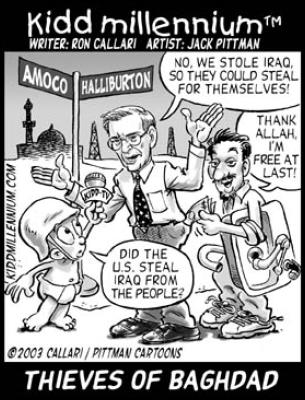Kidd Millennium: Robbing The cradle

Robbing the
cradle
By Ron Callari
roncallari@comcast.net

Iraq was pilfered and plundered by two distinct types of thieves – the local proletariat and the professional art thief. The latter, the more astute and world savvy burglar, the caliber one might find in an Indiana Jones flick – went unnoticed however – sort of like an embedded journalist with a devious ulterior motive.
Iraq often described as the cradle of civilization is a living portal to ancient antiquity that has long lured archaeologists and crafty gravediggers for years. Remnants of man’s origins date back to the prehistoric, Sumerian, Babylonian and Assyrian civilizations that emanated from these lands. In the 8th and 9th century, Mesopotamia was one rocking cultural hangout.
Flash forward and what a difference a millennium makes…
While Baghdad burned in the early years of the twenty-first century and the treasures of the past were nefariously confiscated, the US Secretary of Defense was found fiddlin’ for answers to address the media. Donald Rumsfeld’s now famous litany on freedom was quick to dismiss the liberated looters as a rowdy “untidy” bunch, similar to what one finds in the aftermath of a highly competitive football match up.
"Looting is an unfortunate thing. Human beings are not perfect," Rumsfeld said. “And free people are free to make mistakes and commit crimes and do bad things.”
Apparently oilmen are free to make their own mistakes as well. While the coalition’s military forces threw a dragnet over the Iraqi Oil Ministry building, precious artifacts and relics were allowed to walk. Maybe if the Bush team spent as much time protecting museums and libraries versus nailing down Halliburton contracts, they would have known that organized crime was afoot.
Although not widely publicized, there was one rank and file member from the administration who was vehemently opposed to how things went down. Martin Sullivan, the head of the White House panel on Cultural Property resigned in protest stating that the theft of the Iraq Museum of Antiquities “did not have to happen.”
The priorities of this administration are fairly blatant and art and culture are not two of them. After the successful five finger discount of the Sumerian Warka alabaster vase (circa 3200 BC), Rumsfeld was found cracking jokes with the media, as to just how many “vases” could the country have, as many times as he had to witness the newscast of the same one, “over and over again!”
Most likely Rumsfeld’s level of art appreciation is closer to that of his arch enemy Saddam’s. Several of the palaces once occupied by the despot housed the works of Rowena, the fantasy-art painter. Known for her sexually-charged works featuring buxom damsels and Fabio look-a-likes fighting off taloned-serpents and fire-spewing dragons, the art is often laid down on black velvet. Ironically, these precious gems are now under lock and key. Navy Lt. Charles Owens, a spokesman for the U.S. Central Command in Qatar, said these paintings are assets that are now protected by the interim government.
Not to be labeled one that cannot take constructive criticism, you will see some changes in this government’s sensitivity to “art for art’s sake”. Straight from the Homeland Security Department, a new plan has been hatched, called the “55 card pick-up”. Each card will identify by name and photo the "most wanted" Iraqi officials, in hopes that they can tie some of these thefts to the thugs that use to be in charge.
And of course, we have a whole new country to invade. Next stop, Syria!
In the days of antiquity, the road to Damascus was paved in gold. Hopefully the next phase of Gulf Wars II will commence before the locals melt it down.
Ron Callari
is a freelance journalist and editorial cartoonist who
resides in Jersey City, New Jersey. He and co-creator Jack
Pittman produce kidd millennium cartoons
weekly.


 Eugene Doyle: The West’s War On Iran
Eugene Doyle: The West’s War On Iran Richard S. Ehrlich: Deadly Border Feud Between Thailand & Cambodia
Richard S. Ehrlich: Deadly Border Feud Between Thailand & Cambodia Gordon Campbell: On Free Speech And Anti-Semitism
Gordon Campbell: On Free Speech And Anti-Semitism Ian Powell: The Disgrace Of The Hospice Care Funding Scandal
Ian Powell: The Disgrace Of The Hospice Care Funding Scandal Binoy Kampmark: Catching Israel Out - Gaza And The Madleen “Selfie” Protest
Binoy Kampmark: Catching Israel Out - Gaza And The Madleen “Selfie” Protest Ramzy Baroud: Gaza's 'Humanitarian' Façade - A Deceptive Ploy Unravels
Ramzy Baroud: Gaza's 'Humanitarian' Façade - A Deceptive Ploy Unravels